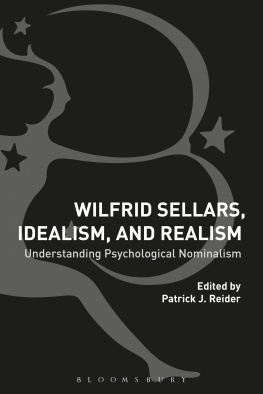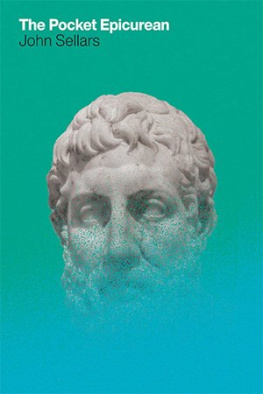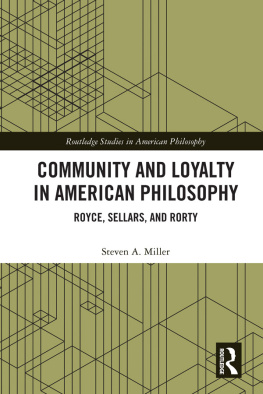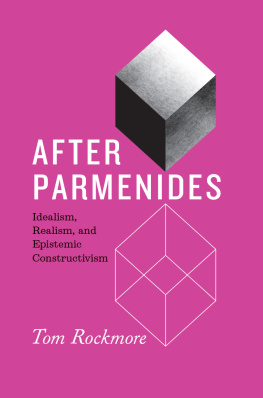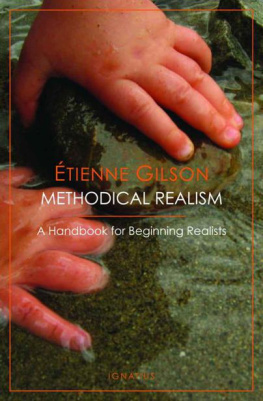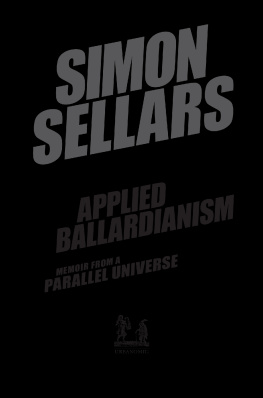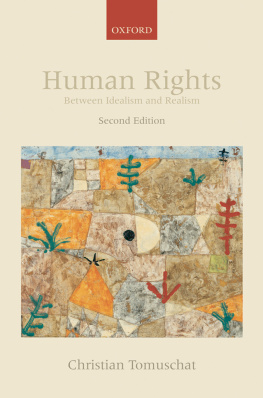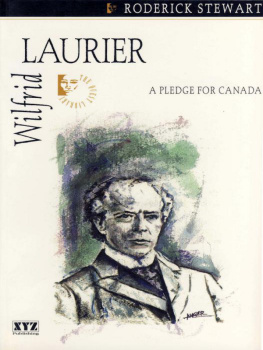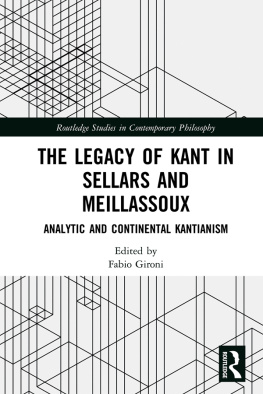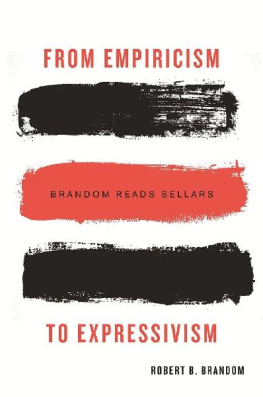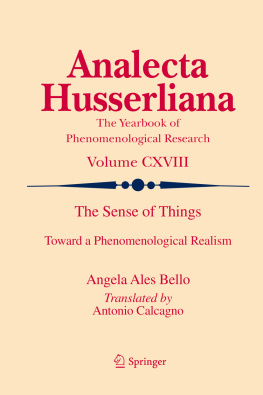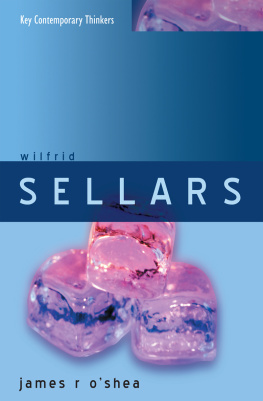Reider - Wilfrid Sellars, Idealism, and Realism
Here you can read online Reider - Wilfrid Sellars, Idealism, and Realism full text of the book (entire story) in english for free. Download pdf and epub, get meaning, cover and reviews about this ebook. year: 2016, publisher: Bloomsbury UK, genre: Religion. Description of the work, (preface) as well as reviews are available. Best literature library LitArk.com created for fans of good reading and offers a wide selection of genres:
Romance novel
Science fiction
Adventure
Detective
Science
History
Home and family
Prose
Art
Politics
Computer
Non-fiction
Religion
Business
Children
Humor
Choose a favorite category and find really read worthwhile books. Enjoy immersion in the world of imagination, feel the emotions of the characters or learn something new for yourself, make an fascinating discovery.
Wilfrid Sellars, Idealism, and Realism: summary, description and annotation
We offer to read an annotation, description, summary or preface (depends on what the author of the book "Wilfrid Sellars, Idealism, and Realism" wrote himself). If you haven't found the necessary information about the book — write in the comments, we will try to find it.
Reider: author's other books
Who wrote Wilfrid Sellars, Idealism, and Realism? Find out the surname, the name of the author of the book and a list of all author's works by series.
Wilfrid Sellars, Idealism, and Realism — read online for free the complete book (whole text) full work
Below is the text of the book, divided by pages. System saving the place of the last page read, allows you to conveniently read the book "Wilfrid Sellars, Idealism, and Realism" online for free, without having to search again every time where you left off. Put a bookmark, and you can go to the page where you finished reading at any time.
Font size:
Interval:
Bookmark:
Also available from Bloomsbury
A Critical Introduction to Scientific Realism, Paul Dicken
Evidentialism and the Will to Believe, Scott F. Aikin
Humanism and Embodiment, Susan E. Babbitt

To my mom and dad and the lessons they taught me
| BBK | Being and Being Known in Science, Perception and Reality |
| BLM | Behaviorism, Language and Meaning |
| CE | The Concept of Emergence |
| CIL | Concepts as Involving Laws and Inconceivable without Them |
| EAE | Empiricism and Abstract Entities |
| EPM | Empiricism and the Philosophy of Mind |
| FMPP | Foundations for a Metaphysics of Pure Process |
| IKTE | The Role of Imagination in Kants Theory of Experience |
| ISR | In the Space of Reasons: Selected Essays of Wilfrid Sellars |
| KTE | Some Remarks on Kants Theory of Experience |
| KTI | Kants Transcendental Idealism |
| LCP | On The Logic of Complex Particulars |
| LTC | Language as Thought and as Communication |
| ME | The Metaphysics of Epistemology |
| MEV | Philosophical Studies 39: 32545 |
| NO | Naturalism and Ontology |
| PH | Phenomenalism |
| PSMI | Philosophy and the Scientific Image of Man |
| SK | The Structure of Knowledge: (1) Perception; (2) Minds; (3) Epistemic Principles |
| SM | Science and Metaphysics: Variations on Kantian Themes |
| SPR | Science, Perception and Reality |
| SRI | Scientific Realism or Irenic Instrumentalism: A Critique of Nagel and Feyerabend on Theoretical Explanation |
| SRLG | Some Reflections on Language Games |
| SRPC | Some Reflections on Perceptual Consciousness |
| SSIS | Science, Sense Impressions, and Sensa: A Reply to Cornman |
| SSOP | Sensa or Sensings: Reflections on the Ontology of Perception |
| TC | Truth and Correspondence |
| TTC | Towards a Theory of the Categories |
Patrick J. Reider, University of Pittsburgh (USA)
This volume is the first study of its kind to address a range of realist and idealist views inspired by psychological nominalism. Bringing together premier analytic realists and distinguished defenders of German idealism, it reveals why psychological nominalism is one of the most important theories of the mind to come out the twentieth century.
Although wedded to important aspects of German idealism, Sellars theory is couched in bold scientific realist terms of the analytic tradition. Those who are sympathetic to German idealism find his realists appropriation of idealism problematic. Wilfrid Sellars, Idealism and Realism thus creates a rare venue for realists and idealists to debate the epistemic outcome of the mental processes they both claim are essential to experience. Their resulting discussion bridges the gap between analytic and continental philosophy.
To understand psychological nominalism and what is at stake in this theory, one should keep in mind two opposing views: nominalism and the specific form of realism it rejects.universals exist independent of the human mind. In opposition to the realists, nominalists argue that universals are created by and inseparable from the human mind. Psychological nominalism is a sophisticated and linguistically centered version of nominalism.
One important aspect of the debate between nominalists and realists concerns the source of human understanding. For instance, in the following excerpt, Michael Loux explains the manner in which the activity of sorting, classifying, and grouping entities together requires the functional use of universals. In this regard, universals play an essential role in our rational thoughts and cognitive experiences:
The objects we talk and think about can be classified in all kinds of ways. We sort things by color, and we have red things, yellow things, and blue things. We sort them by shape, and we have triangular things, circular things, and square things. We sort them by kind, and we have elephants, oak trees, and paramecia. The kind of classification at work in these cases is an essential component in our experience of the world. There is little, if anything, that we can think or say, little, if anything, that counts as experience that does not involve groupings of these kinds.
Loux 2010, 18
Universals are essential to human experience (insofar as it is cognitive or rational), because they account for how it is possible for differing entities to be qualified or characterized in some way by virtue of their all standing in relationship to the same quality or characteristic (2010, 19).
Sellars version of nominalism is a calculated rejection of the mainstream views concerning universals and their operation in language. In what follows, I provide a quick overview of historically popular views on nominalism and realism in order to historically situate Sellars claims and appreciate the types of views that Sellars rejects.
The first view is a version of realism that, for the sake of convenience, I call universal realism. Universal realism asserts (or assumes) that some hidden power of the human soul enables us to non-inferentially and immediately see universals. The idea driving this view is that universal commonalities shared among diverse objects, occurrences, and thoughts exist in a manner that is independent of the human mind and the individual objects that embody them. Universals, themselves, are thus taken to be individual entities that can be named.
If universals exist independent of the human minds that think them, then the standard of truth, objectivity, and knowledge will reside in our ability to observe them. For example, under this view, what makes us aware of someones goodness is his/her exhibition (i.e., something we can see) of the universal quality of goodness. In this context, goodness is a universal quality that exists independent of a particular person who is good. Similarly, the universal quality of red is believed to exist independent of the individual stop signs, London buses, cherries, and fire hydrants that are red.
The second view on universals rejected by Sellars stems from British empiricism. It denies the above view. It claims that, from a sensory particular, the human mind can immediately (i.e., non-inferentially) abstract universal content from sensation. For example, John Locke claims that, from the sensation of a particular shade and tint of a red flower, the mind can subtract all of its specific or particular qualities. This operation is thought to endow the mind with an immediate (i.e., non-inferential) recognition of general ideas, such as redness. He further claims that the general and universal belong not to the real existence of things; but are the inventions and creatures of the understanding, made by it for its own use (Locke 1995, 330).
The third view we will consider is rationalism. It denies the empiricists claim that we somehow abstract universals via our senses and argues instead that the human intellect is naturally endowed with a functional grasp of universals. As Descartes argues in his famous wax example, sensation without rational judgment fails to provide knowledge or understanding. In this regard, he claims that, through the intellect,
Font size:
Interval:
Bookmark:
Similar books «Wilfrid Sellars, Idealism, and Realism»
Look at similar books to Wilfrid Sellars, Idealism, and Realism. We have selected literature similar in name and meaning in the hope of providing readers with more options to find new, interesting, not yet read works.
Discussion, reviews of the book Wilfrid Sellars, Idealism, and Realism and just readers' own opinions. Leave your comments, write what you think about the work, its meaning or the main characters. Specify what exactly you liked and what you didn't like, and why you think so.

